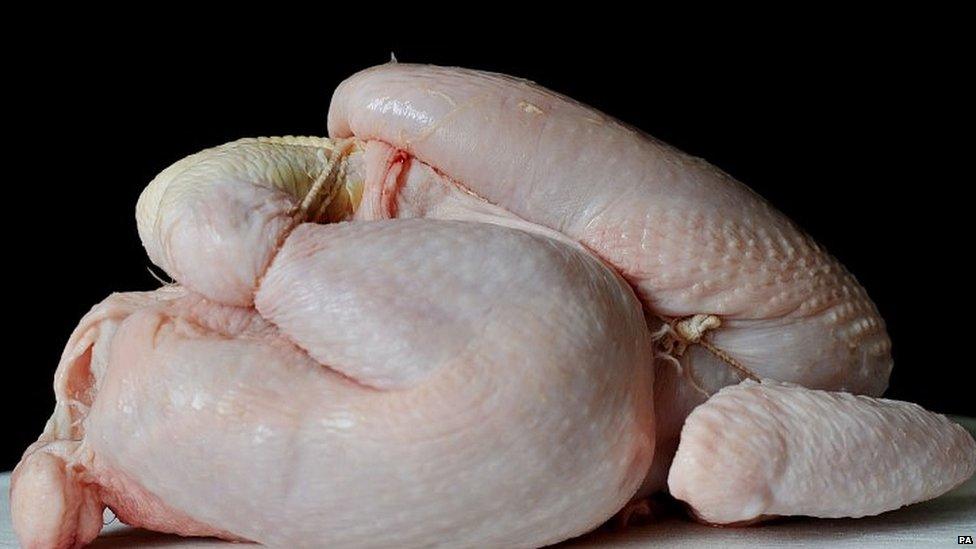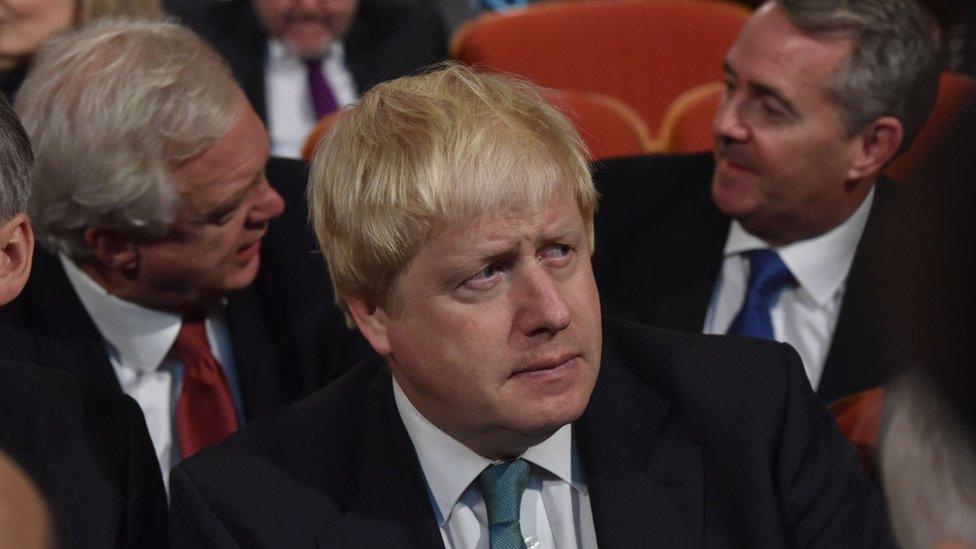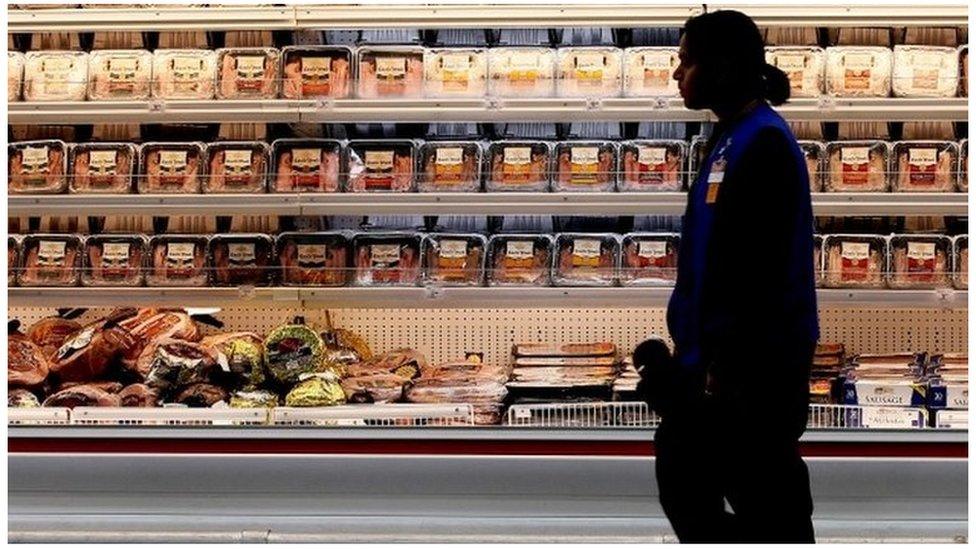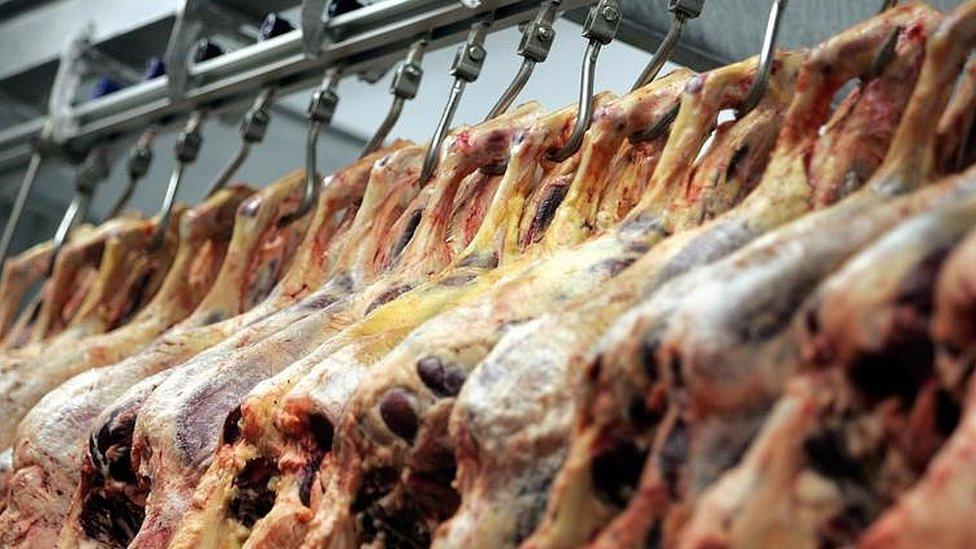Michael Gove: UK won't accept US chlorinated chickens
- Published
- comments
Environment Secretary Michael Gove tells Today a US trade deal will not allow chlorinated chicken
The UK should not accept imports of chlorinated chickens as part of any future trade deal with the US, Michael Gove has said.
The environment secretary told the BBC that the UK would not "compromise" on or "dilute" its animal welfare standards in the interests of trade.
The EU currently bans chlorine-washed chickens on welfare grounds.
International Trade Secretary Liam Fox has questioned this but downplayed the potential for UK-US disagreement.
It will be up to the UK to decide whether to retain the ban once it leaves the EU in March 2019.
Labour said the government's "casual and inconsistent" approach risked undermining British farmers.
On a visit to Washington on Monday, Mr Fox said chlorinated chicken was just one detail in one sector that would only be addressed at the end of discussions about a free trade deal - which are likely to be years away.
He has suggested there are no food safety issues regarding chlorine-washed chickens, a view shared by many UK experts.

What is chlorinated chicken?

In the US, it is legal to wash chicken carcasses in strongly chlorinated water.
Producers argue that it stops the spread of microbial contamination from the animal's digestive tract to the meat, a method approved by US regulators.
But the practice has been banned in the EU since 1997, where only washing with cold air or water is allowed.
The EU argues that chlorine washes could increase the risk of bacterial-based diseases such as salmonella on the grounds that dirty abattoirs with sloppy standards would rely on it as a decontaminant rather than making sure their basic hygiene protocols were up to scratch.
There are also concerns that such "washes" would be used by less scrupulous meat processing plants to increase the shelf-life of meat, making it appear fresher than it really is.

Agriculture is likely to be one of the sticking points in talks over a deal, amid concerns about differing farming and welfare practices, such the use of growth hormones given to cows and cattle.
Asked whether lifting the ban on chlorinated chickens was a price to be paid for sealing a post-Brexit deal with the US, Mr Gove told BBC Radio 4's Today: "No. I have made it perfectly clear we are not going to dilute our high environmental standards or our animal welfare standards in the pursuit of a trade deal.
"We need to ensure that we do not compromise those standards. And we need to be in a position as we leave the European Union to be leaders in environmental and in animal welfare standards."
On whether poultry could scupper a US trade deal, he added: "The Trade Secretary, quite rightly, pointed out that, of course, this issue is important, but we mustn't concentrate just on this one issue when we look at the huge potential that a trade deal can bring."
While membership of the EU meant the UK had to accept some environmental obligations "which do not work in the interests of the environment", he said the UK had been a world leader in environmental standards for decades and that would continue after Brexit.
Fox: It's early days in US trade discussions
Mr Fox, who concluded a four-day trip to the US on Wednesday, has said the UK will not be lowering its food safety or animal welfare standards after Brexit but decisions on US chicken imports and other consumer protection issues should be based on scientific advice.
"There is no health issue with that - the European Union has said that it is perfectly safe," he said. "The issue lies around some of the secondary issues of animal welfare and it's perfectly reasonable for people to raise that, but it will come much further down the road."
A Lords report on Wednesday warned that UK farmers' livelihoods could be threatened by an influx of cheaper food imports from the US. It said there was evidence that UK consumers would be willing to pay more for food reared to higher standards but it remained to be seen if this would happen in practice.
For Labour, shadow environment secretary Sue Hayman said the cabinet was in disarray over the issue.
"Theresa May must set the record straight by publicly supporting British poultry farmers and committing to protect the British public from substandard food produce in a race-to-the-bottom Brexit," she said.
But Conservative MP John Redwood said British farmers were already losing out to cheaper competition from the European continent, where welfare standards - both in terms of the rearing and transport of animals - were not as high as in the UK.
"When we leave the EU we will be free to set our own standards, which will be higher than EU minimum requirements," he wrote on his blog. "This makes animal welfare an odd argument for people to use who want us to stay in the EU system."
- Published26 July 2017

- Published24 July 2017

- Published25 July 2017
